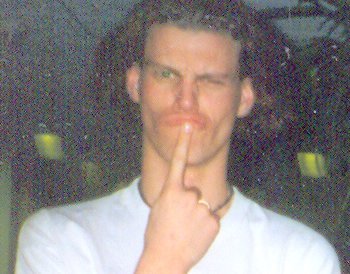The Next Reformation by Carl Raschke
Here's our first book review. Intially we'll have a conversation about the book. If you desire to contribute - feel free! Once we're done I'll do a full review here at the top.
Here's a link to the book: The Next Reformation by Carl Raschke
Here's a link to the book: The Next Reformation by Carl Raschke

4 Comments:
So this is a book review/dialogue. Its experimental, so we'll see how it goes. Perhaps we'll figure out a good system by the end.
Jeff
I'm in chapter 1 and I'll probably go through it slower than you, but how do you want to set up a discussion of it? Since you are unaware of my question at this very moment, I'll proceed with the questions I have for you.
What's your take on his claim that postmoderns "do not deny that there is truth and objective reality," but it's simply that they "question their ability to distinguish truth from nontruth"? (p. 17) I had not made this distinction. I rather like it, but I'm not sure how convinced I am that it's true. (I realized I made a pun after I wrote that in earnest.)
I heard you once call yourself a Modernist. What is your take on his nasty little jabs at the "bitch godess Reason" (p. 18) and "modernist idolotry"? (p. 23)
I'm enjoying this. Thanks. You're the best pastor ever. :)
Amy
Ha! (On the ' pastor' line.)
Why is the title silly?
Okay, I think just doing the emails back and forth would probably be good. I guarantee that I won't be going that fast. In fact, why don't you set the pace, and write me at the end of each chapter, and I'll read and respond.
On PMs believing in objective reality but believing we can't engage it: this is Kant. And Raschke goes off on Kant for a while at the beginning of Ch. 2 (which is as far as I've got). Kant believed in what he called Noumena and Phenomena. Noumena is the world as it is; Phenomena is the world as it appears. Kant believed that when we come to experience it is poured into our minds much like water into an ice cube tray. Our minds are the trays, and they categorize the rush of experiences. So all we know is the result of this categorization. I don't know if PMs are skeptical of Kant (perhaps he didn't go far enough....how can you tell me how my mind works if all you know is phenomena?). But there is an argument that could be made. Something like, There must be an objective world hitting our senses, or else we would not have the experiences we have. We may not know the objective world, but we can conclude it is there. It is the only thing that would make sense of our experiences (given Kantianism). So, the argument would go something like that...
On Jeff the Modernist: I am certainly in the midst of an epistemological crisis. But I'm not scared. I hit Postmodern thought, and was quite intrigued especially as I thought through its relevance in ministering to people. So I have tried to understand and embrace it, in part. On the other hand, I see it not as a landscape to be entered, and to thrive in, but as a necessary critique of modernity and its excesses. Modernism has been mortally wounded, and the buildings it erected are coming down everyday (more and more quickly it seems). Postmodernity however does not have staying power (in my mind) because it is a critique. It is not an affirmation of something solid that humanity can bite into and create from. I may be wrong here, but it seems to me that postmodernity is a bridge between the modern world and some new world to come. We shall see....
I like NT Wrights thoughts on this, and I actually incorporated quite a few of them into my talk Sunday. He suggests an epistemology of love, where by we know things, not through objective, disinterested reason. But through intimacy with the object known. Knowledge is more than facts, right. It is one knowing something through unity and participation and dancing with the object. I don't know if that has enough to get us over the hill, but I am intrigued....
I do understand the jabs Raschke was making, and think them apt (though maybe a bit misleading).
Jeff
CS Lewis in his essay "God in the Dock" puts forward a picture of God standing before modernity not as the judge but as the accused. Reason/ modern man/ etc are a kindly judge. If God has a reason for all the horrors in our world certainly he will here God's defense and be merciful if warranted. This is the picture it seems Raschke is putting forward as the outcome of a modern epistemology which elevates "reason" to deified standing. Speaking for Luther he says, "Any effort to make God a plain item of common sense is both gratuitous and idolatrous" (31). He calls such thinking "anthropocentrism." My initial question is going to be, how do you avoid letting in your reason to tell you what is real? To in fact judge between this ideology and that ideology when seeking the best explanation for how the world is?
I do identify with his initial definition of PM saying, "Postmodernism is at base a theory of language that lays bare what...kirkegaard called the "infinite qualitative difference" between the exhibitions of human intellect and the splender of the eternal maker" (32). NT Wright related PM to the Tower of Babel: that Modernities constructions and accomplishments are being pulled down by God confusing the languages. (I found it an interesting parrallel).
Post a Comment
<< Home